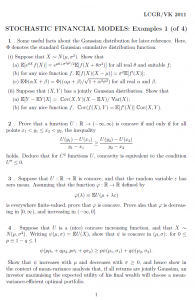For the past few weeks, the subject of burnout has been firmly on my mind. I watched a team member go through an acute burnout, and it made me realise that I should be more careful with my own balance. As I formulated my thoughts on the matter, I couldn’t help thinking back to this classic Friends episode.
I’ve always been both aware, and confused, about this whole burnout concept. The most prominent time that I experienced it was at Cambridge. I’ve written about it before, but a basic week there involved 40 hours of maths, and in reality it was more, especially in exam term. And on top of this, the lecturers went quickly. Really quickly. There was no time to ask questions, and most importantly there was no way you could catch up if you suddenly switched off for a few minutes during one. So for 3 to 4 hours a day you would be intensely focused, not letting your mind wander, constantly processing each step of the proof that was being presented at a crazy pace.
The other day I needed to arrange a simultaneous interpreter, someone who like in the UN would both listen and speak at the same time. The agency told me that by law they had to be given a break every 30 minutes. I inwardly laughed – 30 minutes was pretty wimpy – but I completely understood where they were coming from. Maintaining that level of intensity is truly draining.
 So each term at Cambridge would start off well. The first day I would nail the lectures, understand everything, feel like I was totally in control. My lecture notes would be written up, and I would remember the salient points. When the first example sheet (homework) would come I’d be able to answer most of the questions and spot the relevant bit of the notes to look up for each one.
So each term at Cambridge would start off well. The first day I would nail the lectures, understand everything, feel like I was totally in control. My lecture notes would be written up, and I would remember the salient points. When the first example sheet (homework) would come I’d be able to answer most of the questions and spot the relevant bit of the notes to look up for each one.
But four weeks into the eight week term, things would start to look very different. Although the pace would increase only slightly, what I would notice is that I was simply no longer able to keep up in lectures. I’d miss the logic behind steps. I’d be scrambling to work out what things meant while the lecturer would have already moved on. I’d have no recollection of the notes when I would come to doing the later example sheets.
Overall there was this rather strange paradox. There were six days of lectures – so those were full working days, and there was no choice about it. But for Sunday I had a choice. I could relax, try to recover, and miss out on the chance to catch up on some work, or I could do a working day, catch up, and be “better prepared” for the week ahead.
And the same paradox existed on a much bigger scale, with holidays. I could either relax and recover for a few months, preparing myself for the next term. Or I could revise the previous one, and get as far ahead as possible on the notes from the next one, to give myself more leeway.
In my first and second years there, I was young and I was unprepared. I literally burned out. By the end of the first term I was exhausted, and confused about why for the first time ever, maths wasn’t easy for me. My third year, however, came much later, after a gap. By this point I was older, wiser, more disciplined and more self aware.
The signs and symptoms of the impending burnout were easy to spot. Waking up in the morning was harder. The excitement just wasn’t there anymore. But the first thing I’d want to do as soon as I got up was mathematics. There was a fear of not doing it, and the instinct to do it as soon as possible after waking up, while I still had at least a semblance of energy. I’d be totally unable to process things at the pace that I knew I could, and that would in itself make me even more annoyed. I’d be unable to hold things in my head, or easily recall things I knew I’d learned. And overarchingly I’d feel totally out of control. I’d be on autopilot, sticking to a preprogrammed routine.
When I left Cambridge and started Ometria, I was on fire. I was a machine. On weekends I’d do online courses, physical classes, or hackathons. I finished CS50x, built a web app single-handedly, and won a hackathon, all while building a company. I was unstoppable. I’d found my calling in life.
I always wondered whether I was going to be able to keep up this pace forever. It’s been exactly two years now, and it’s interesting to be able to see. My days are intense. I get several hundred emails a day, which are just part of life and don’t really progress things. I manage a sizeable team. But on top of all this I also do a lot of ‘work’. Actual work – writing detailed documents, preparing algorithms, memorising talks. My days involve wearing many different hats, with the context switching overhead that this brings.
So I’ve been monitoring for the symptoms. First things first, every single day I jump out of bed, excited. That’s the one that is not going anywhere – ever. So that’s good.. But I’ve found quite often that I’m running my days on autopilot. Meeting after meeting, email after email, with almost no time to think strategically. To see the big picture. To understand where we are and what we should be doing.
I’ve found quite often that on a Sunday I’ll do a bit of work in the morning – maybe a document that needs peace, quiet and a few hours of concentration. But then for the rest of the day I’ll let my mind rest. I’ll play a computer game, or, much to the dismay of my fiancee, watch a Jason Statham movie. I’ll wait until Monday morning to plan the week, rather than using Sunday night as a chance to get ahead.
This has come naturally – it’s what my mind and body wants, and I’m letting it do it. Because the alternative is not something I’m willing to accept. I watched a friend and team member burn out recently. He had set himself the most intense pace I had ever seen. He’d be the first one in the office, even with a long commute. Staying in the office until at least 10pm every evening, he would get home and still spend time with his family. He kept this up for about a month. And then he literally called up and said it’s all got too much, I need two weeks off. I haven’t heard from him since. A lot of pieces needed to be picked up. A weaker team would have struggled. But we are Ometrians – we are always prepared to jump in and shoulder the burden.
I’ve learned a lot about burnout through the years. I feel like I have a system to keep it under control. First of all, awareness of the symptoms is vital. Without that, there is no chance of preventing it. We all have different levels of endurance, so it takes great self awareness to allow yourself to push all the way to the edge, and then back off in time.
Second, is a balance of recovery. One of the main symptoms of burnout is this feeling of being on autopilot, and of wanting to do work all the time. This is something that has taken me a long time to fine-tune. You absolutely cannot spend all day every day working. It leads to bad decision making, bad output, stress and ultimate burnout. But you also cannot simply drop things, especially when you have responsibilities to many people. That’s not an option either. I cannot just decide to not look at emails for a weekend – that’s just not acceptable for a tech CEO.

So what you need is the perfect balance. I’ve just spent a week on holiday. The moment I landed I had 45 emails. By the time the bags arrived I’d handled them. Over this week, I’ve kept entirely on top of what was happening in the office, I’ve overseen the things I am directly responsible for, such as PR and investor relations, but I have taken a huge amount of time out. No balls have been dropped. I’ve got a tan, managed to finally read Dune, and even watched the sun rise over the sea after a particularly late night – something I never allow myself during everyday life.
And how do I feel? Well I’m definitely not on autopilot. I’m totally in control, although currently there’s a lot less to be in control of – and that’s where I think the big win is. People who are go-getters are always try get to take on more. See how productive they can be. See how much they can do. Taking a holiday means you can drop anything not important, only manage the core group of responsibilities, and reset yourself to a baseline where you are totally in control. As soon as I return, I’ll no doubt pile my plate up again. But for the moment it’s all good.
 So that’s the solution. Be totally aware of the symptoms, and as soon as you hit a feeling of being on autopilot, reset yourself – whether that’s with a one hour yoga class, a weekend away, or a fully blown holiday. Get back in control, gather your strength, and then prepare to push forward again.
So that’s the solution. Be totally aware of the symptoms, and as soon as you hit a feeling of being on autopilot, reset yourself – whether that’s with a one hour yoga class, a weekend away, or a fully blown holiday. Get back in control, gather your strength, and then prepare to push forward again.
Because, when it comes to burnout, the Rachel quote is slightly wrong. It is that common, it does happen to everyone, and it is a big deal.
